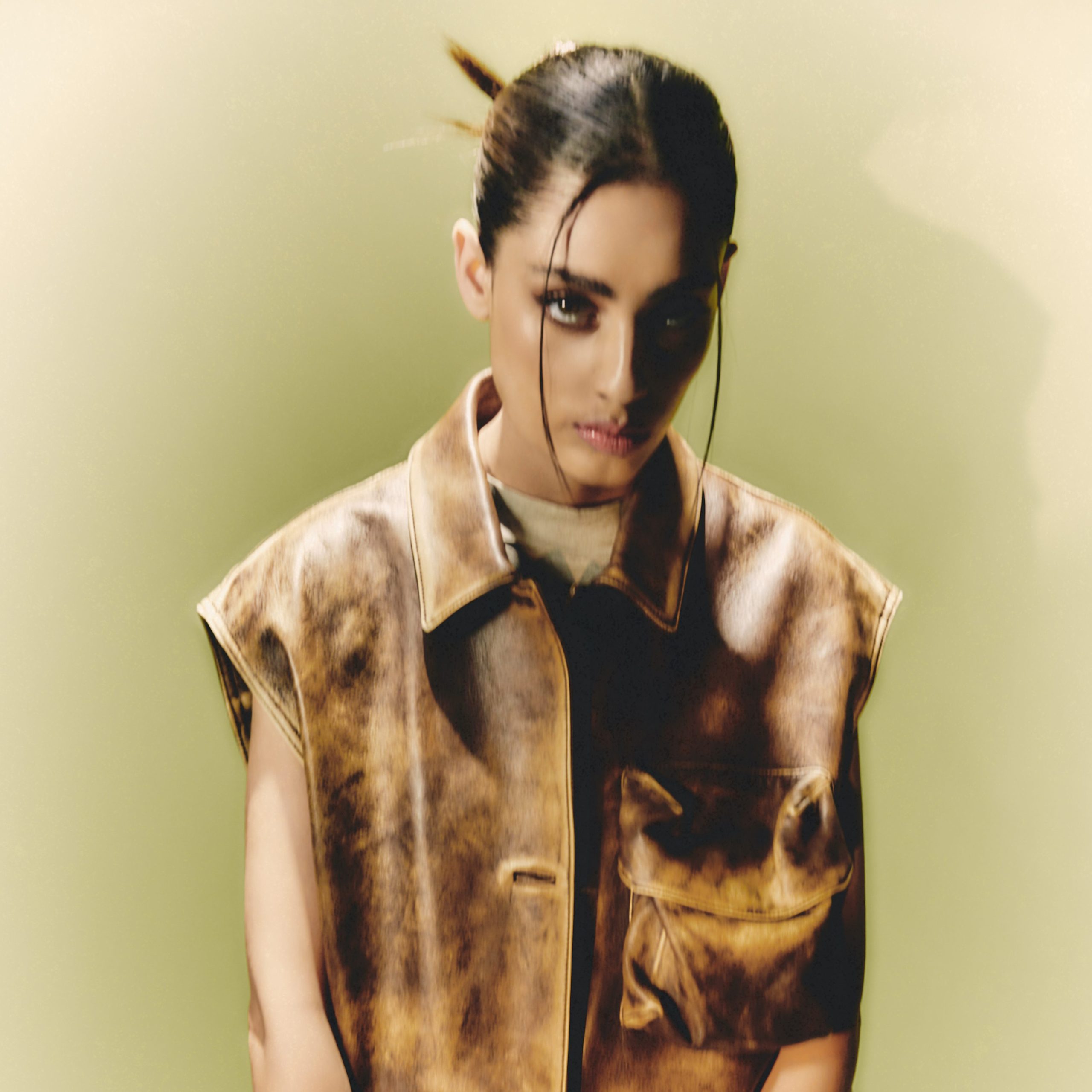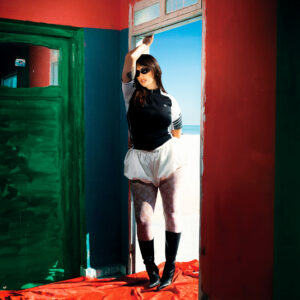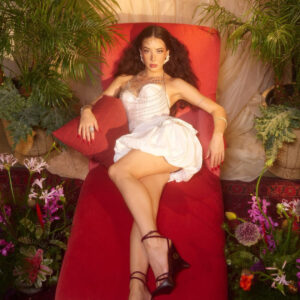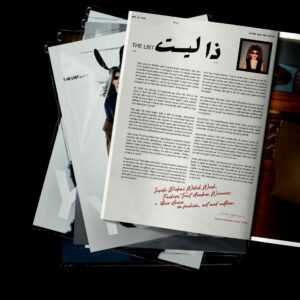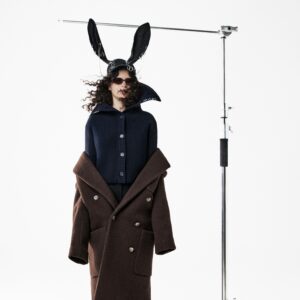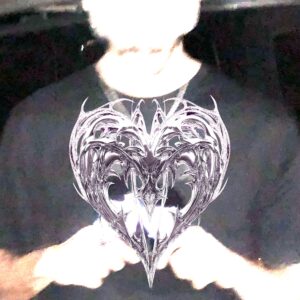Zeyne’s (Instagram) childhood home in Jordan was a veritable symphony of sound, the air always buzzing with music, from her mother’s lilting humming to her sister’s classical piano and her father’s eclectic collection of CDs collected from his global adventures. Her earliest memories were permeated with the gentle hum of her mother’s voice, which seemed to reverberate throughout their home, leaving a lasting imprint on her. “My mum has a beautiful voice,” she reminisces, “and she used to sing just inside the house, not anywhere else. I grew up just listening to her voice. It was very special to me.” Music seemed to flow through the veins of Zeyne’s family, passed down from one generation to the next. “My mother got her voice from her mum. I guess that’s where I got it from.” It was her grandmother who had first passed on the gift of singing, and she traces her own musical talents through this matriarchal lineage.
Naturally, she found herself humming along, tuning in to the frequency of her own voice, discovering her own musical abilities as she went along. Steeped in this musically-charged environment, she picked up bits and pieces from her surroundings, incorporating them into her own unique palette of sounds. “My dad loved listening to all sorts of music. He traveled a lot and he would get all these CDs and tapes from the countries he was in. South African jazz and other things that you wouldn’t expect to listen to at the age of four,” she says. Her father’s penchant for international music piqued Zeyne’s curiosity, leading her to explore different musical traditions from around the world on her own. Today, she incorporates elements of Arabic music, jazz, pop and R&B into her own compositions, engineering a sound unique to her.

Born and raised in Amman, the 25-year-old artist of Palestinian origin credits her musically-inspired upbringing for shaping her into the singer and songwriter she is today. Music was woven into every part of her life, a rich tapestry of sounds and rhythms that she couldn’t help but be swept up in. It was her sister who sparked Zeyne’s inclination towards the piano. Her sister, who was professionally trained, would play the instrument with a musicality that fascinated the young her. At the tender age of three, she remembers being entranced by the way her fingers danced across the keys, the notes swelling and falling like the ebb and flow of the sea. “I was fascinated, musically, by the way she was playing the piano,” she recalls. “I looked at my mum and I was like, ‘I want to play piano.'” And so, a few years later, she began taking piano lessons herself. It was a natural fit – the instrument felt like an extension of her own body, and she poured her heart into every practice session. As she grew older, her skills only sharpened, and she found herself turning to the piano again and again as a source of comfort and inspiration.
“Now I find myself writing my songs on the piano, because it’s the instrument that feels most like home to me,” she says. And indeed, listening to her music, it’s easy to hear the gentle, soothing influence of those early piano lessons, the way the notes curl and unfurl like tendrils of smoke. The piano has become not only an instrument, but a vessel for her emotions, her thoughts, and her creativity. It was a sanctuary for her, a place where she could lose herself in the melodies that she created. Writing her songs on the piano felt like second nature to her, like coming home.
As she grew older, Zeyne’s interest in music only deepened, and she began to take formal lessons in piano and voice, which she continued for over a decade. “When I was a child, I always had this dream of going into the arts. I just loved the idea of being on a theatre stage and performing. I just think I never had the confidence. And so that idea was always planted inside my head. I think I just convinced myself that I couldn’t do it,” she says. Her affinity for music had been an ever-present in her life, yet it largely remained on the periphery, in part due to her anxiety and shy demeanor. “All my life I’ve been shy of singing in public. I’ve been taking piano lessons and vocal lessons since the age of five, but I never wanted to share it with anyone. It was just very personal to me.”

And so, music took a back seat as she pursued her studies in Media Communications and Sociology at Sussex University in Brighton, navigated the 9-5 grind and took on an array of internships and desk jobs over the years. As Zeyne settled into her career, she felt a gnawing sense of dissatisfaction, strains of music still hummed in the background of her mind, a persistent presence that refused to be ignored. After completing her studies, she landed a coveted job offer at a public relations firm in London. The opportunity seemed too good to pass up, offering her not only a full-time job, but also sponsorship. “At the time, I was like, wow, of course, I’m gonna stay here. Of course, I’m gonna move to London,” she recalls. But life had other plans for her.
When she returned to Amman to renew her papers and travel documents, the world was hit by Covid-19, and everything came to a grinding halt. The pandemic completely derailed her plans and she was devastated when the lockdown in Jordan cost her the job in London she had been aiming for throughout her undergraduate.
Locked down at home with her plans for a career in PR on hold, Zeyne felt trapped and unsure of what the future held. But it was in the midst of this forced seclusion that she discovered a safe haven in music, that passion that had been simmering beneath the surface for so long.
“I was just stuck at home, stuck in quarantine. I opened this account. And I was like, you know what, I’ll just entertain myself, and I’ll entertain others as well. So I started posting covers, and slowly my account started growing,” she shared, describing the moment she started her Instagram account.
Zeyne was able to find a silver lining in the form of her newfound passion for music. She found herself spending more and more time singing, experimenting with different genres and sharing her voice with the world. Singing became a form of therapy for her, helping her navigate the uncertainty of the pandemic and find purpose in a time of upheaval.

Initially, she had only intended to share covers of her favorite songs, revealing only half of her face and planning to delete the account at the end of her two-week quarantine period. But by the end of the 14 days, she had amassed a huge following, with listeners across the MENA region and beyond loving her soulful English and Arabic renditions of R&B hits. And so, she renamed the account “Tunes with Zeyne” and continued posting cover videos for another 10 months.
Instagram marked the starting point a musical journey, an unexpected springboard found due to life’s sudden changes, one that led her down a path she had never envisioned for herself. “It took me by surprise. Genuinely, I did not expect any of this to happen. When I opened this account, it was with the intention of just growing my confidence towards singing publicly,” she shares. Her journey from an uncertain, locked-down graduate to a confident and talented musician is a reminder that unexpected detours can often lead to unexpected rewards.
Soon, Zeyne’s covers began to take on a life of their own, with listeners eagerly anticipating each new upload. As her audience grew, so did her confidence, and she began to see music as a viable career path. As her Instagram account started gaining traction, she began receiving messages from people around the world who were moved by her voice and talent. For Zeyne, music became a way to connect with others during a time of global isolation, to offer comfort and solace through the universal language of song.
Her journey towards becoming a musician and artist has been nothing short of serendipitous. Through her page, she quickly gained recognition and began forging connections within the Jordanian music scene. Riding high on this momentum, she eventually joined the Jordanian Female Artist Collective and, in due course, was invited to perform at the Amman Jazz Festival. She crossed paths with several influential music industry veterans, including Hana Malhas, a revered mentor and trailblazer in the independent music scene, and the founders of Keife Records, who were quick to offer her a record deal. This pivotal moment marked the beginning of her professional journey, which she began under the moniker @whoiszeyne.

Not long after her momentous breakthrough, she had the good fortune of meeting her producer and confidant Nasir Al Bashir. It was he who first encouraged her to write her own original works, insisting that she give it a try despite her initial reluctance. “Don’t say that you don’t know how to without trying,” he implored. “I don’t know how to write,” she replied. “No, no, it’s fine. Just try.” And so, armed with nothing but her own innate creativity and Al Bashir’s guidance, she set about the task of crafting her own unique sound and style. Her first single was born.
For Zeyne, the creative process was both challenging and liberating, but it afforded her the opportunity to channel her deepest emotions into her music and use her voice to tell her own story. Her debut single, “Minni Ana,” a fusion of Arabic and English lyrics, touched on themes of self-discovery, anxiety, and boundary-setting, tackling difficult and often taboo topics that resonated with audiences worldwide. As she explains, “My music is simply about life, real events, real life events, stuff that you usually bottle up like your insecurities, or your traumas or your identity to stay cool.”
The creation of “Minni Ana” was a deeply personal journey that required both immense courage and vulnerability. Working alongside her co-writer and producer Al-Bashir, she embarked on a therapeutic exploration of her own psyche and experiences. The process demanded honesty and transparency, as Zeyne dug deep to unearth her most profound fears, doubts, and insecurities. But as challenging as it was, the experience ultimately proved to be a powerful source of catharsis, allowing her to find clarity and release through the medium of music.
Zeyne’s desire for self-expression is almost palpable. “I want people to discover who I am through my music,” she says, a testament to the power of her art to communicate her innermost self to the world. Her journey of musical self-discovery has been nothing short of incredible. Reflecting on her humble beginnings, she marvels at the mysterious workings of the universe. She notes how her six-year-old self could never have predicted that she would become an artist and musician. “It’s funny how the universe works. Despite your plans, the universe always has other plans for you,” she muses. Zeyne believes that music found her rather than the other way around, and she acknowledges that that statement is cliche while remaining adamant about its truth. Looking back, she is filled with joy and gratitude for how things have played out. “It’s all I’ve ever wanted, but I guess I never believed in myself. It’s funny how the mind works as well,” she says.

Zeyne, now a rising star in the world of R&B and soul music, has a singular goal: to create a new, Arabic-inspired sound that seamlessly blends the best of both worlds. Her passion for storytelling-driven lyrics is evident, as she weaves together her own personal experiences with the rich cultural influences of her upbringing. It is this approach that renders her music both relatable and authentic as she seeks to capture the essence of the human experience.
“There is no one specific message,” she says. “What I’m trying to do with my music is share my story and personal experiences through the window of songs. We all tend to relate through that window one way or another. I’m excited to share mine and see how people resonate.” As an Arab woman who grew up in Jordan and with roots in Palestine, Zeyne aims to break down barriers by sharing her story with listeners, transcending language barriers with her fusion of Arabic, R&B, pop, and soul music.
Her eclectic musical background is a driving force behind her unique vocal style and poetic lyricism. Drawing inspiration from a diverse range of artists, including the likes of Ziad and Elias Rahbani, Fairuz, Lauryn Hill, and H.E.R., her music seamlessly blends early 1990s R&B and soul influences with modern Arabic soundscapes. Zeyne’s artistry is a testament to the power of cross-cultural collaboration, combining disparate musical traditions to create something entirely new and fresh. Her passion for reinventing R&B and soul music in Arabic is evident in every note, as she skillfully crafts a sound that is both familiar and yet entirely her own.

For Zeyne, authenticity is key, “I always preach about being authentic and storytelling, and telling your story in the way that you would and not filtering it for anyone else,” she explains. “It’s just being real with who you are, and not shying away from anything you go through.” Through her music, she invites listeners into her world, allowing them to connect with her on an emotional level. And she remains true to her promise of writing music that reflects who she is – a talented artist with a unique perspective, determined to make her mark on the world.
Her latest release is a true testament to her artistry and storytelling prowess. With “Ana Wein,” she delves deep into the pain and struggles of a relationship beyond repair. The haunting quality of her vocals leads listeners through an emotional journey of regret, denial, anger, and ultimately, acceptance. The song, co-written by Zeyne, Nasir Al Bashir, and Lina Makhoul, sounds almost like a film score, highlighting the emotional beats through orchestral elements and iconic ballad instrumentation.
However, Zeyne’s music is not just a personal expression of her own experiences; it also represents the struggles and hopes of her generation. As someone with a dual-heritage identity, growing up in Jordan with Palestinian grandparents, her upbringing was shaped by both cultures. Her love for traditional Palestinian dance, dabke, began at a young age and she toured with a dabke group at just five years old. This cultural influence is interwoven throughout her music, with nods to her hometown of Nablus, and her second single, “Nostalgia” is a heartfelt tribute to Palestine and its people. As a member of a generation of Palestinians that has inherited a sense of immense grief and loss regarding their homeland, she reflects on the feeling of yearning for something that was never experienced.
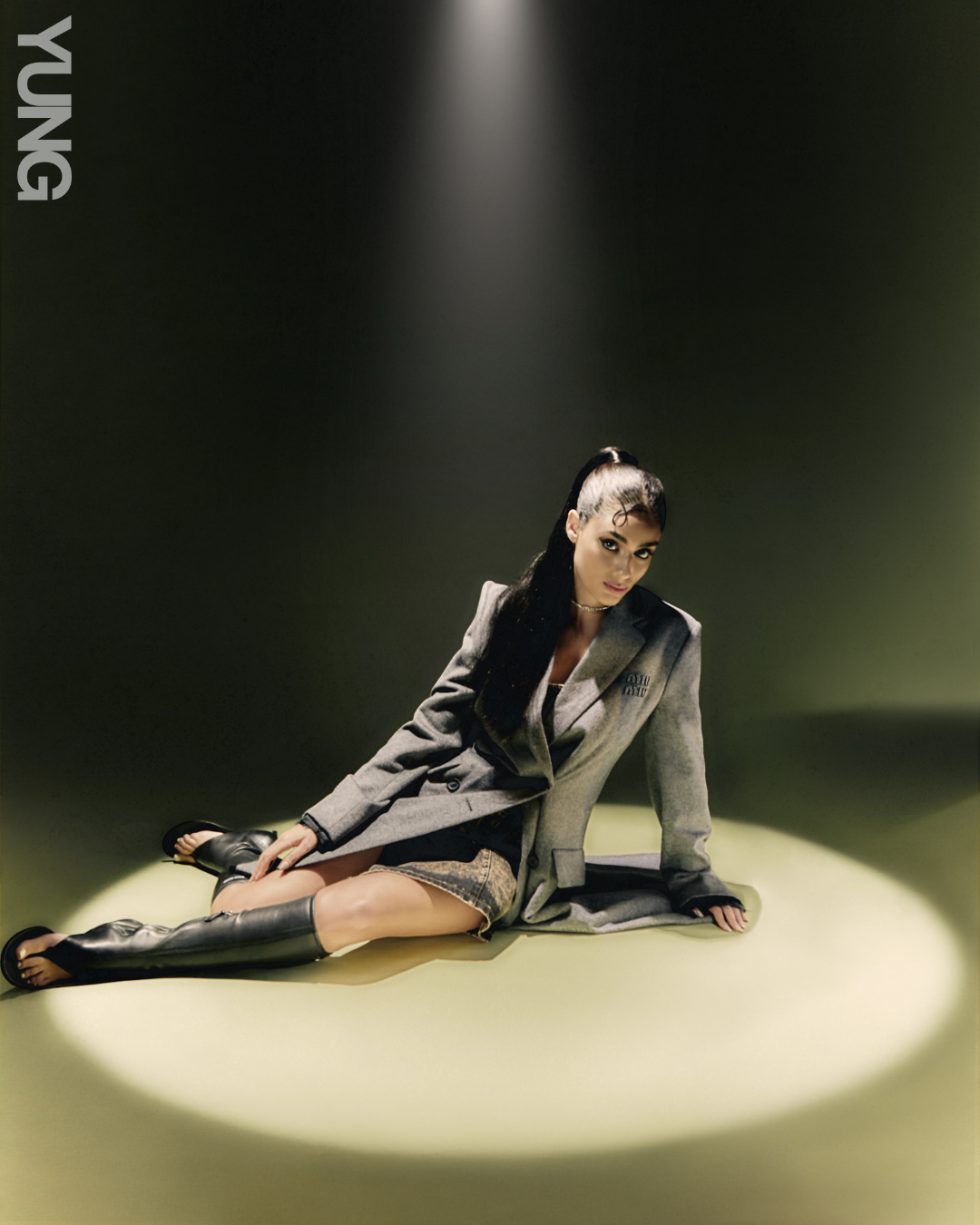
Through her music, Zeyne aims to break down barriers and transcend language barriers by sharing her story and personal experiences with listeners. Her ability to blend Arabic, R&B, pop, and soul music creates a new sound that is both relatable and authentic. By staying true to her promise of writing music that reflects who she is, she serves as a voice for a generation.
Despite initially expecting her music to never leave the confines of the MENA region, Zeyne’s soulful melodies and ethereal vocals have transcended the borders of her homeland of Palestine and her bedroom in Amman, resonating with audiences across the Arab diaspora in Canada, the UK, the US, and parts of Europe.
“So I look at the analytics, and I’m like how does this make sense? The music that I’m making, very R&B, but with twists of Arabic scales, or Arabic melodies in there, with Arabic lyrics, started resonating very strongly with Arabs living in the diaspora,” she says. Remarkably, despite being based in Jordan, Zeyne’s largest concentration of listeners on Spotify are in Egypt, followed by the US.
She attributes her success, in part, to the dynamic Jordanian music scene, which has cultivated a tight-knit community and supportive environment for artists to flourish in a region that formerly relied on established music hubs such as Cairo and Beirut, saying, “The music scene in Jordan has boomed quite fast in the past year and a half. If you told me to talk about the music scene like 10 years ago, it would be predominantly made up of just men, whether that was indie rock bands or, or indie artists. But there weren’t any strong female artists, except for one or two.”

“Purely musically speaking”, the past year and a half has witnessed a remarkable shift in the perception of the Jordanian and Palestinian accents, she says. Previously, the norm was to see Arabic artists gravitating towards the Egyptian or Lebanese dialects. However, the Palestinian accent is now emerging as a trendsetter. Zeyne contends that this has given her the impetus she required to gain confidence in the accent she employs in her music. In her opinion, the newfound popularity of the Palestinian accent has created a void that Arabic R&B music, particularly performed by female artists, can fill.
Her meteoric rise in the music industry has ignited a fire in the region. Though she entered the scene just a couple of years ago, her Arabic releases have already become viral sensations, adding her voice to the chorus of change that’s sweeping the region. She believes that Arabic music is poised to become the next big thing, following in the footsteps of the K-Pop phenomenon and the widespread popularity of Afrobeats. “With the Arabic language becoming more universal, there is more of a global appeal to it. Arabic music is the next in line to become global. And I feel like in two years’ time, there will even be award shows with a new category for the MENA region in general,” she says. Zeyne’s astute assessment of the landscape underscores her intuitive grasp of the musical zeitgeist and reveals her as a true innovator in the Arabic R&B scene, in the region and beyond.

This interview is a cover story for YUNG: The Anniversary Issue, which will soon be available where all great magazines are sold.
For more stories and interviews, check out our dedicated music and arts & culture pages.
